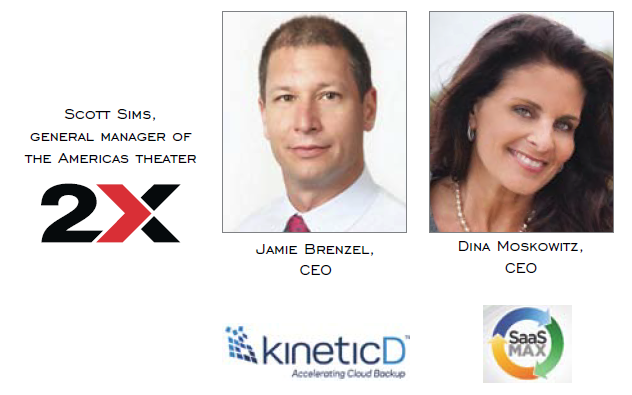Warning: Enterprise Cloud Is Not A One-Size-Fits-All Solution
By Jay McCall, Business Solutions Magazine
Depending on your customers’ requirements, you may need to partner with several cloud providers to ensure you’re offering the right solution.

I recently looked at a report showing the top searched terms and phrases at our website. Not surprisingly, “cloud computing” was the most popular choice, outpacing the runner up nearly twofold. As a result of cloud’s continued popularity, I’ve been reaching out to our readers and cloud computing vendors to uncover the most pressing cloud issues facing the channel. In this article, experts from 2X Software, KineticD, and SaaSMAX offer their advice regarding the steps you should follow to select an enterprise-grade cloud service provider as well as some tips for overcoming the top objections you’re going to face against your biggest competitor: “the consumer-based cloud service.”
4 Cloud Data Center Details You Can’t Leave To Chance
When it comes to selecting the best cloud service option, the experts agree there is no one cloud service provider that’s able to meet all your customers’ needs. The bottom line is that if you focus on selling solutions and services to multiple vertical markets, you’re going to need to partner with multiple cloud service providers.
The biggest mistake IT solutions providers make, according to Dina Moskowitz, CEO of SaaSMAX, is not doing their homework to understand the customer’s requirements. “If you’re only getting the IT person’s input, you’re probably not getting the whole picture either,” she says. “The CFO and/or the legal department could be aware of certain legal requirements or compliance issues that the IT person isn’t.” By getting multiple stakeholders involved, you’ll have a better understanding of all their requirements, which is the first step in knowing which type of cloud service provider to partner with. For example, some customers will be all about budget — backing up to the cloud or accessing applications in the cloud as inexpensively as possible. For others, security will be the primary concern, and for others it will be making sure that authorized users can easily retrieve data pushed to the cloud.
The number one pitfall VARs/MSPs (managed services providers) fall into with regard to selecting a cloud services provider is in the category of security, according to the three experts I talked to. “Security risks can be greatly minimized by doing the proper due diligence,” says Scott Sims, general manager of the Americas theater at 2X Software. “Not all cloud data centers are created equal.” After going through the process outlined earlier to understand your customer’s security requirements, you should address the following four security points with your cloud provider:
Physical Security Of The Data Center. As a starter, it’s important that your provider’s data center is SSAE 16 (an internationally recognized third party assurance audit) certified. However, Jamie Brenzel, CEO of KineticD warns, “Just because the building a cloud data center is housed in is certified doesn’t guarantee the data center meets these standards. In addition to validating the data center’s certifications, you also need to find out which level of SSAE 16 they’re certified at.”
Equipment Used In The Data Center. Brenzel is a big believer in this point. “It’s important you know what kind of storage appliances, firewall security, and other IT hardware and software your cloud provider uses,” he says. “Everything should come from recognizable name brands like Cisco, Dell, HP, and IBM, not some generic clone.” According to Brenzel, if the cloud provider is taking shortcuts on its IT investments, it will come back to haunt you both.
Facility Redundancy. This is an interesting one because unlike the other two, which are standards you’ll want to use for all cloud providers, this one falls under a different category. First, you need to cut through the marketing hype. Every facility claims to provide data backup redundancy, but some are misleading in how they do it. For example, a cloud provider might brag about having data centers located on multiple continents, which gives you maximum business continuity assurance. If you read the fine print, however, you may discover it only actually hosts your customer’s data in the data center that’s physically closest to your customer. The second important point about facility redundancy is this: In some instances, your customer may need its data replicated on multiple continents, and in other cases doing this could put your customer out of compliance with an important industry regulation. “This is why if you’re going to deal in multiple verticals, you need to pay close attention to the unique requirements from each customer, and you’re going to likely need to work with multiple cloud service providers,” says Moskowitz.
Security, Financial History. The final key step to choosing a cloud service provider is to look at its security audit history, says Brenzel. Have they had any outages? If so, for how long? “It’s equally important to know their financial history. How likely is the company to go out of business? If they would, is there a service-level agreement in place that ensures your customer would have uninterrupted access to its data?”
Overcoming The Price Objection
Coming up with the right cloud offering for your customer is half the battle with selling cloud services. “VARs also need to evaluate how the solution will perform within budgetary constraints,” advises Sims. “Using complementary solutions that help the customer maximize the benefits of multiple cloud solutions is the best way to achieve this goal.” For example, your customer’s cloud requirements could potentially be different according to the business application they’re using. For instance, it may require maximum security and accessibility for its Oracle database, but its Microsoft Office applications could fall into a much less stringent category. By taking a hybrid approach to selling cloud services, you’ll better be able to provide a highly customized solution and service that offers the appropriate security and redundancy at a price that fits your customer’s budget.
